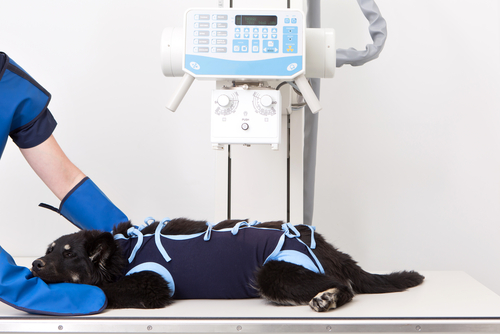 Whenever a pet is admitted into the hospital for surgery, for an anaesthetic, whether that be for surgery or for something like x-rays, it is always a concern for the owner because they are leaving their pet with you, and they are not going to be with them and they do not always understand or know what is happening behind the scenes. Now the reason that we need to anaesthetise or sedate an animal for an x-ray, is because, unlike us, they will not lay still on an x-ray table, in order to take the x-rays. Also, in a lot of these situations, we are x-raying a site because it is painful, to try and find out what is wrong with it. And so, by putting the leg into the right position, maybe manipulating a painful hip, we are causing a little bit of pain, which is unavoidable, in order to take that x-ray. So, if they are put under an anaesthetic, it is better for them, because they can not feel any of that pain and it makes an x-ray much, much simpler to do.
Whenever a pet is admitted into the hospital for surgery, for an anaesthetic, whether that be for surgery or for something like x-rays, it is always a concern for the owner because they are leaving their pet with you, and they are not going to be with them and they do not always understand or know what is happening behind the scenes. Now the reason that we need to anaesthetise or sedate an animal for an x-ray, is because, unlike us, they will not lay still on an x-ray table, in order to take the x-rays. Also, in a lot of these situations, we are x-raying a site because it is painful, to try and find out what is wrong with it. And so, by putting the leg into the right position, maybe manipulating a painful hip, we are causing a little bit of pain, which is unavoidable, in order to take that x-ray. So, if they are put under an anaesthetic, it is better for them, because they can not feel any of that pain and it makes an x-ray much, much simpler to do.
With any anaesthetic that we use or sedation, we always have the option of doing what is called a pre-anaesthetic blood test. What this does, is looking at liver function, kidney function, looks at red blood cells, to make sure there is no sign of anaemia, no sign of infection and to make sure that we are happy to put that animal underneath an anaesthetic. Make sure that their kidneys and their liver are healthy enough to take on that anaesthetic, metabolise it and excrete the products from the body safely so that their recovery is as safe as possible.
The other thing that we would always do is, check the heart and check a temperature, as well, before putting an animal under anaesthetic. We need to know that these things are normal so that we can monitor and keep those anaesthetics as safe as possible while the animal is asleep. The anaesthetic machines and monitoring equipment that we use in all veterinary hospitals is very modern and tells us if there is anything wrong very quickly so that we can make changes to the anaesthetic as appropriate. We do get anaesthetic deaths, as you do in the human world, as well. And these are sadly unavoidable. Nothing we can do to prepare for those or avoid them. And, it is just one of those things that, unfortunately, does happen. However, it is a very, very low risk and the number is negligible per year. The benefits of having that surgery or that x-ray would far outweigh the risk of having the anaesthetic.


Pingback: Physiotherapy and hydrotherapy are successful ways of treating pets